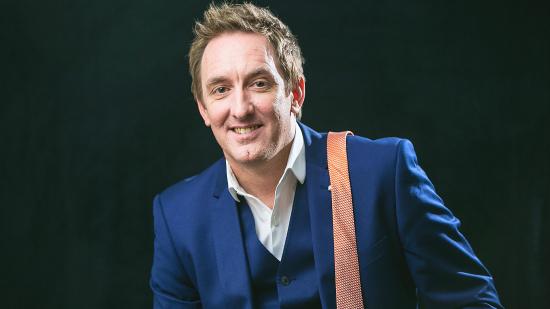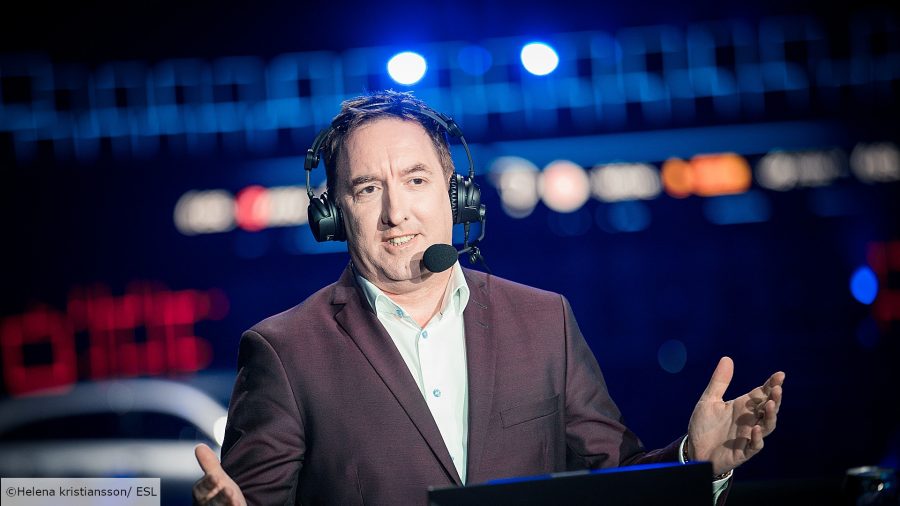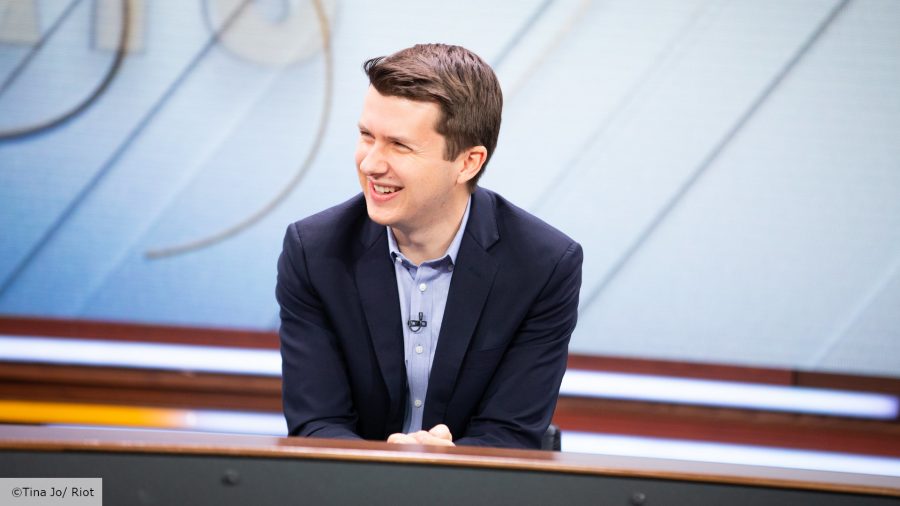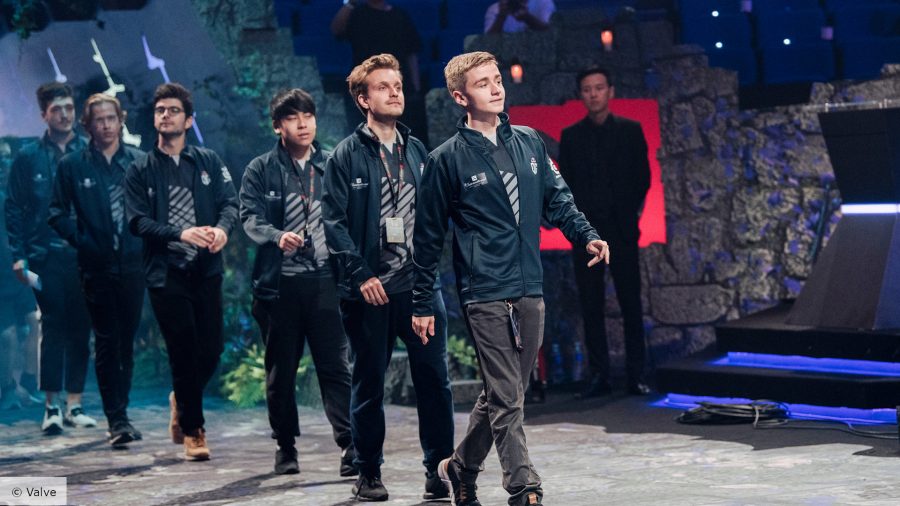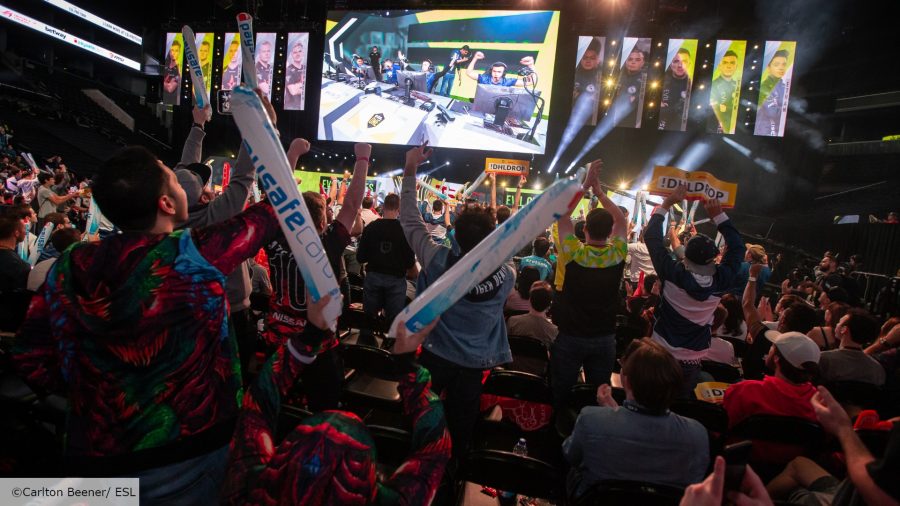He’s one of the most recognisable faces in the esports industry and was covering competitive gaming before some of you were even old enough to pick up a controller.
So there aren’t many people better placed than Paul ‘Redeye’ Chaloner to write a book on esports. From the industry’s humble beginnings, to the sell-out arenas and controversy that have existed both in the past and present, Redeye has experienced it all. This Is Esports (And How To Spell It) is no autobiography (although there are plenty of personal anecdotes and insights), but rather a comprehensive guide to everything you need to know about the crazy world of esports.
The Loadout got the chance to have a chat with Redeye about his motivations for writing the book, some of the key moments in esports history he covers within its 244 pages, as well as some of his thoughts on the best storylines in competitive gaming.
The Loadout: While there’s plenty of stories for avid esports fans to sink their teeth into in your book, it also caters for newcomers. Why did you decide to make this accessible for a mainstream audience, rather than keep this as a project for those who know the industry already?
Paul Chaloner: Well, I think the initial driver – and this goes back, you know, five or six – years, is that the esports industry for a long while needed a book that was essentially a primer for esports. One that we could hand to someone like my father who’s 72, or people in other industries that maybe mocked our industry and didn’t know enough about it. And so we’ve been talking about it for quite a few years.
But the other part of me knew that a lot of my fans – and a lot of esports fans in general – wanted to know more about what goes on behind the scenes. So those were the two primary drivers. Trying to write a book for both those audiences is actually very, very tricky because what is really cool and interesting for one isn’t necessarily cool and interesting for the other. So Ben Sillis [co-author] and I agreed very early on that the book would try to enthuse esports fans as well as, well, muggles, to coin another term from a fellow Bloomsbury author! We wanted to appeal to both sets of audiences, but we didn’t want to diminish either one.
Also, no one has really written a proper history of esports book before. And I think in the first half of this book, that’s what we’ve done. I wouldn’t say it’s conclusive and it’s 100% of what has happened. I think down the line we probably need a really big body of work to cover just the history of esports, but I think we’ve done a much better job than anyone else.
TL: Were there any aspects of esports that you found particularly difficult to explain or simplify?
PC: I don’t think we did find it tricky, no. I’m well practised in approaching people or other people approaching me and saying, ‘What’s this nonsense about competitive video gaming?’ And I’ve done hundreds of TV interviews over the years with news networks and TV shows where the first question is, ‘What is esports?’ or ‘How does it work?’ or ‘Is it a real sport?’ So I think I’ve got quite well versed in answering those and doing it in such a way that helps a non-esports audience understand what it is.
TL: One of the standout quotes from the book came from your chapter about casting in which you say ‘I don’t deal with strategies, but I do deal with storylines.’ Which casters out there in the esports scene right now live up to that motto and are the best storytellers?
PC: That’s a really good question. I think it’s always difficult to single out a single person, so I’ll mention a few. Obviously there are different styles too because you’ve got a play by play caster or a more analytical caster, and I know obviously an analytical caster is not there necessarily to tell the story. But I think that the best ones that do that on the colour side are people like Joshua ‘Jatt’ Leesman for instance in League of Legends, because he’s able to use his analysis but then piece it into the narrative about what’s going on in the match, and within the storylines that they’ve got. Jatt’s very good at it from a colour point of view.
I also think Christopher ‘MonteCristo’ Mykles is outstanding. From a colour point of view he’s able to knit narratives together that are analytical and maybe even mathematical at times, and use a lot of smarts to get you to a point where you’re like, ‘Okay, that makes sense.’ From a storyline point of view, that’s awesome.
On the play by play side, Matthew ‘Sadokist’ Trivett has always been an incredible storyteller. He’s able to weave the narrative of the match, the players, and the teams, but he also throws his own little quirks into there as well. He’s always ready with a quick quip that kind of adds to that feeling that I’m part of a story. And likewise in Counter-Strike I think Anders ‘Anders’ Blume is also very good at storytelling and putting that together and bringing the players to life more than anything else.
We’re so blessed right now with high quality casters that look for the narrative rather than just, you know, shouting into a microphone as it were.
TL: Talking of storylines, one you refer to a lot is OG winning back-to-back TIs. For you, is that the greatest storyline in esports history so far?
PC: The OG story… from even before the TI wins. I think it’s an incredible story that probably deserves a film or a book of its own at some point; maybe that’s the next one we’ll write! But take Johan ‘N0tail’ Sundstein as a player and you think about what he went through: he won these incredible three majors and they were amazing, but then he still keeps failing at TI and it doesn’t matter what team is, he keeps failing. And for all that time there has been a man alongside him who’s basically been his brother, you know, he’s real life brother, and that’s Tal ‘Fly’ Aizik.
And then all of a sudden, three months before the next TI, they break up for the first time in six years. And they go separate ways to two different teams that have potentially an equal shout at winning but are also in turmoil in terms of changes and then both of those teams go to TI and then they meet…
These storylines are just fancible. You look at them on paper and think, ‘that’s not true, that just can’t be true.’ You’d never get away with writing a script like that for a movie. And then OG, after this crazy three month journey of finding players and just putting it together with band aids and hoping that we do okay suddenly ends up in a TI win. And then they come back two months later and win it again – it’s unbelievable.
So yes, I think it probably is one of the most incredible esports stories of all time, as a story that started out many many years before the first TI win even happened… And then you consider Sebastien ‘Ceb’ Debs who’s gone from caster to analyst to coach to part time fill in player to TI winner twice. Like, what the hell? I mean his story alone is an incredible story. So there are so many just woven into that OG storyline that I think it’s just such a rich story that anyone – no matter whether you’re an esports fan or not – can get behind.
TL: Now one chapter of the book stood out to me in particular, and that’s the one on women in esports. You took a back seat for this and let several successful women in esports tell their stories directly instead. Why did you make that choice?
PC: It’s a difficult subject to approach as I’m a middle aged white guy that’s had the privilege of being given video games for my entire life, right. So it’s very difficult for me to talk about that subject in any qualified capacity. I felt that the only way we could do justice to that section of the book was to open it up and get the people that have experienced esports firsthand and that are considered to be people who have outstanding ability in their particular fields.
I just thought that this was the best way of doing that. I interviewed many of these amazing people anyway, but even interviewing them wasn’t… It just didn’t feel like I could do it justice in my own words. Ben and I struggled with this section a lot. I will admit that we wrote it ourselves originally and then said, ‘No, no, no, this is not it – we can’t get the full story here.’
So I wanted the voices of other people that had gone through this experience, both positive and negative, so that we were being true and honest with the reader, right? We weren’t trying to sugarcoat this. We weren’t trying to cover stuff up – we were tackling the issue head on. And we were doing it through the eyes and the voices of the people that have experienced it themselves.
I actually learned a huge amount literally by reading all of the interviews that we did, and all of the feedback that we got from the amazing people that helped us with that chapter.
TL: On hearing their stories, what needs to change do you think to make esports a more equal place?
PC: I don’t have all the answers. I don’t have many of the answers, actually. But I do talk to a lot of women in esports about the way forward. For instance, I’m not a big advocate of female-only tournaments. I don’t think we should have female only tournaments. I think we’re not a gender-separating pursuit. But I also recognise that it’s very difficult for women to break into esports right now because there are barriers to entry out there. Women suffer from an incredible amount of abuse verbally online and that has to stop, you know. We have to start treating people better.
Then there’s those who say to me, ‘But women aren’t very good at games in general.’ Well, if you think they aren’t, why is that? Is it because they just aren’t as able? Is it because they haven’t had the opportunity? And I would say yes, that’s probably why, because given the right opportunities, I think that women could be outstanding in some games. I think they could definitely be better than men in some games.
But I also look forward to the day where it just doesn’t bloody matter what your gender is, or what your sexuality is, and you could just play videogames. Isn’t that the whole point of why we came together in the first place? When we first started playing online, I played people from all over the world, I didn’t care what country they were from, or what their skin colour was. I just cared about beating them in game. And if I won, I celebrated and they said ‘GG and well played.’ And if they won, I said ‘GG well played today.’ And that’s how it should be for me.
I know it’s a very altruistic, utopian dream, but we’ve got to aim somewhere so why not aim there?
TL: Finally, I want to ask about the current generation of new esports players. Young players are coming through and they’re kind of the first to be coming straight into a scene that has massive prize pools and is well established. Some accuse this generation of being a bit spoilt or entitled at times, so do you agree? And if so, should they brush up on some esports history to see how lucky they are?
PC: That’s a really good question and I don’t know that I have the answer to that. I don’t know that it’s my place to say whether they should be more grateful or not.
I think when people disrespect others that have helped build the industry, I do get a bit upset. I remember a tweet a few weeks ago that Joe Miller made around hiring people from universities and someone replied to him and said, ‘Ah, you’re just doing this for the internet points.’ And, you know, Joe is a legend. I mean, Joe Miller is one of the original esports casters; he cast the CPL World Tour back in 2005, for crying out loud… He’s a big deal. He’s a big figure. I think I would have liked to have seen some respect paid at the very least.
I don’t care about the argument. I’m quite happy to have the argument with anyone. But I would have loved to have seen the chap in question just pay Joe a little bit more respect.
So if it comes down to that, sure. I think some of the more brash players that are coming in now don’t realise it. They haven’t had to experience the kind of things that some of the older players have, and the likes of myself and Joe Miller have had to go through where we literally didn’t have enough money to pay the bills, but we still did what we did, because we love the scene and we wanted to grow the industry.
But the whole reason we did that is to get to where we are today. So is it right then to criticise people for enjoying the fact that they can dive into an industry without much experience and do immediately well and win millions of dollars of prize money? Is it wrong of us to criticise those people for enjoying that? I don’t think they deserve that, no. I think they should be able to enjoy it. And if they pay some respect along the way, fantastic if they don’t, well, I’m not gonna lose any sleep over it.
Paul Chaloner’s book This Is Esports (And How To Spell It) is out now. You can pick your copy up here.
